
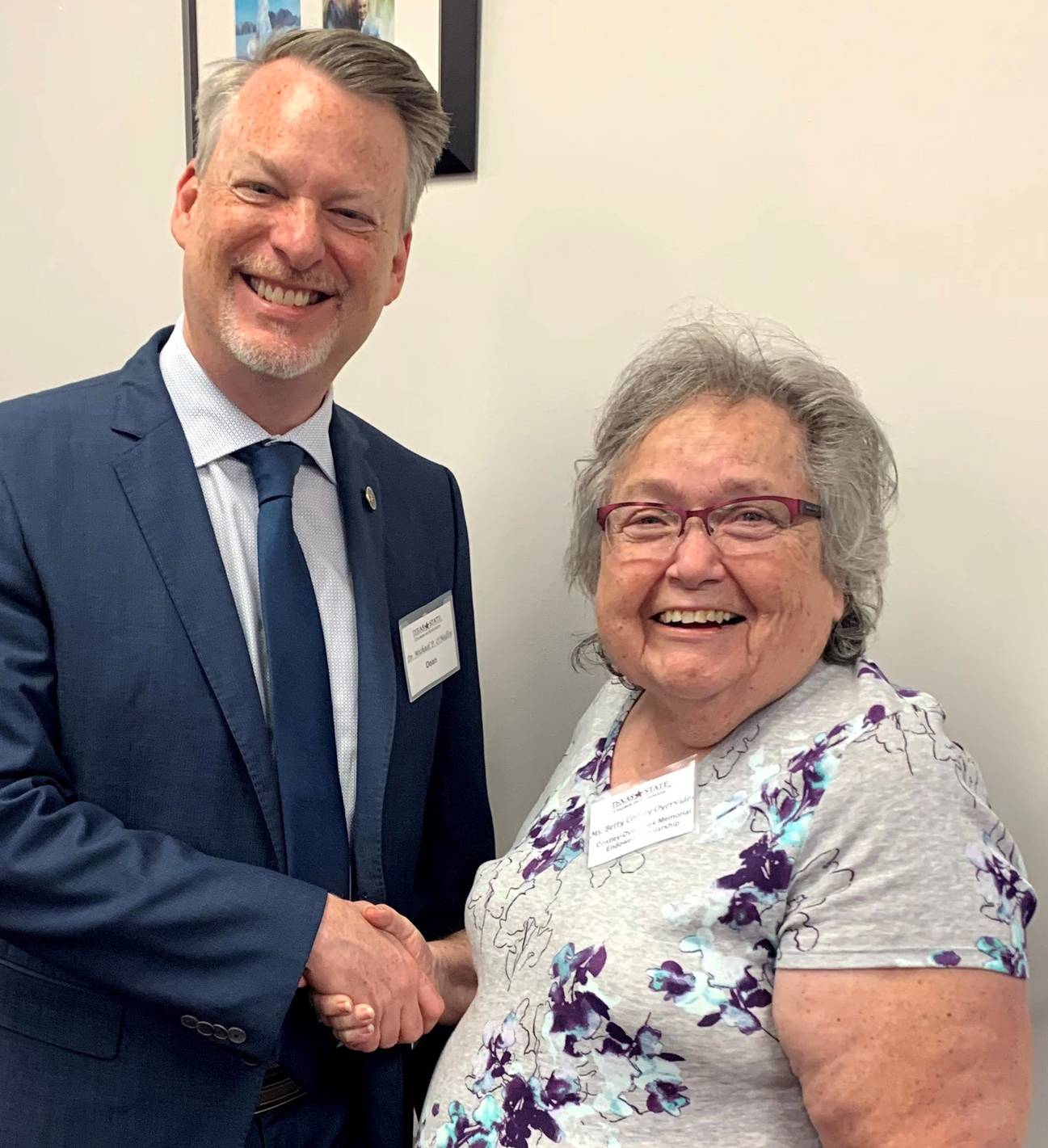
Betty Costley-Oyervides (M.Ed., ’79) says that she did not always think she was in the right place at the right time, but she has made it the right place at the right time. Today, at 83, she is enjoying the laurels earned through a lifetime of service.
Part of that service is giving back by endowing scholarships that will help students like she was — a teacher who made it a goal to complete a graduate degree and an educator who took on a challenging assignment.
Costley-Oyervides grew up in a family of teachers and preachers. “I didn’t want to be a preacher because my grandmother was a preacher and dragged me to her preaching gigs pretty regularly. I learned spirituals in Spanish and English. When I get together with one of my longtime friends, we sing those old songs in two languages, to see who sings the loudest!” she says with a laugh.
The octogenarian has seen it all, or most of it, and says exactly what she thinks. “My last name is a combination of my mother’s and father’s names. When I tell people my name is Betty Costley-Oyervides, they ask which of the names is mine. I say, ‘all of them!’ People ask me where I am from and I tell them my family has been in Texas since 1842, but we are all immigrants. I come from Irish and Mexican stock.”
As an undergraduate, she double majored in Spanish and English, and taught high school in Austin following graduation. After accepting a district-wide position in community development, she began commuting to Texas State for a master’s degree in education, specializing in organizational development. Originally established as a model for the college of business, organizational development was then something new to education.
In Austin, Costley-Oyervides was awarded a $12 million grant to assist with desegregation. “When I learned that the school district was spending $25 million to fight desegregation, I decided it was time to get on my horse and leave,” she explains. “I moved to Waco and took a job with the education service center, providing English as a second language and bilingual material and support to 12 counties east and west of Waco.”
She continued commuting to San Marcos for her master’s degree, a goal that took her six years. “While it was a struggle at times, being a nontraditional student was a gift. The other students were so courteous, and the instructors and professors recognized that we were adults trying to do something better.”
Along the way, she shifted gears again and found herself back in the classroom – albeit in an unusual setting. “I took a job with the Windham School District, which was the education system for the State of Texas prison system, employing about 1,000 teachers across the state.”
She began with English, teaching GED-prep and writing, but soon found herself using the organizational development skills she had learned, teaching “Turning Point,” a cognitive-emotional behavior therapy course at the prison. “I taught my students things they would learn if they were getting psychiatric help in the free world, but it was in a classroom setting. I could see people changing as they learned. I have worked in some seemingly futile, impossible situations, but seeing success has always been so rewarding.”
When she retired, Costley-Oyervides wanted to help others who, like her, work full-time and pursue higher education. “I was able to gift the Costley-Oyervides Scholarship to the College of Education. I want to provide a scholarship for those who are working, and who need financial aid to get them back into college this semester and next semester. I worked my way through college as an undergraduate and grad student – and know what it is like to not know if you can afford the next semester.”
She believes that giving this money where it is needed is the best thing she has ever done. “I said, ‘Let’s do this other one. Ten times bigger – 10 times more fun!’ ”
Costley-Oyervides has also named Texas State in her estate plan. She has established The Texas Women’s Endowed Scholarship with preference to junior and senior undergraduates or graduate students, preferably female, with financial need.
“Before COVID, I was invited to an event for donors (in the College of Education). I was able to meet students, see The Wittliff Collection, and visit with professors and staff. I so enjoyed talking with students all over campus. They were so helpful and friendly. They don’t have to be nice to strangers, but they are.
“I don’t know how one would teach this – but it is just the culture of Texas State University. I believe it is taught by example. I am very happy when I am on campus,” she says.
Costley-Oyervides exemplifies the art of leaving the world a better place. In more than 50 years of service in education, she admits that this has been the most rewarding. “I am proud of the Costley-Oyervides Scholarship, and the estate scholarship is even going to be even better. I am glad to be able to help young women who are struggling to balance work and school and are not sure how they are going to get through these last few semesters. There is so much joy in giving.” ✪
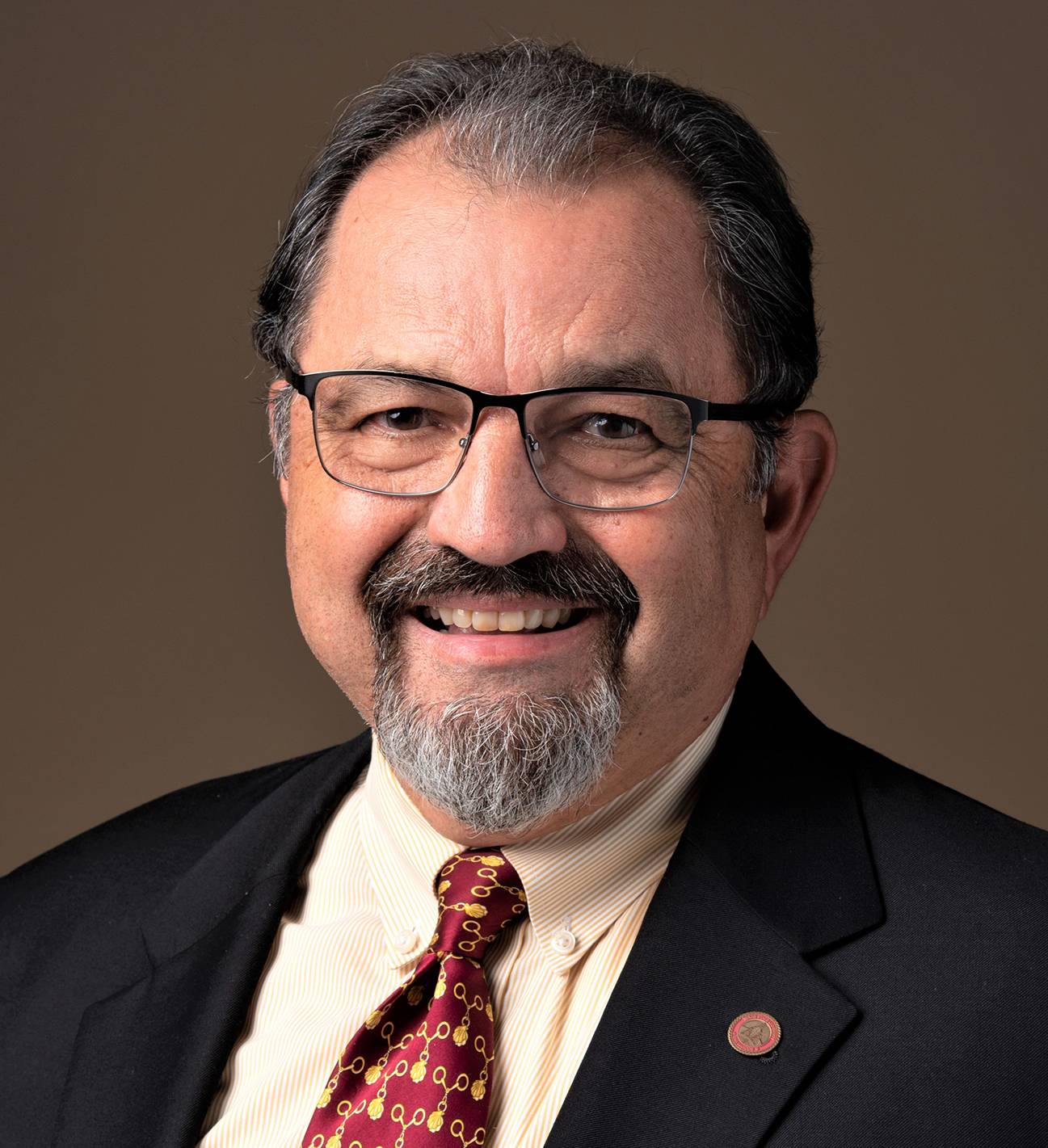
Spend a few moments with Richard Garcia (B.S. ’75) and it’s difficult not to be intrigued.
Over a 30-year career in law enforcement, Garcia pursued bank robbers and terrorists. He infiltrated international drug cartels and money laundering operations. He helped lead disaster recovery efforts following the 2003 Space Shuttle Columbia disaster and learned the fundamentals of undercover work training alongside FBI agent Joe Pistone, aka Donnie Brasco.
“Yeah,” Garcia chuckles, “my life hasn’t lacked drama.”
As Garcia’s career progressed, he says he increasingly reflected on his life’s good fortune, including the professional springboard Texas State University provided. This led to the creation of the Richard and Nan Garcia Endowed Scholarship. The award benefits first-generation college students who are military veterans — a nod to Garcia’s son, Carlos, a U.S. Army veteran — and those interested in law enforcement careers.
“I was a first-generation college student and my Texas State degree opened up a world of opportunity for me,” says Garcia, noting that his brother, Robert, earned his criminal justice degree in 1976 before similarly entering the law enforcement ranks. “If I can plant that seed for someone else, it’s important I do that.”
As early as elementary school, Garcia knew he wanted to be a police officer when his father’s cousin, a San Antonio police officer, drove by the Garcia family home and allowed the 12-year-old Rich to turn on the patrol car’s lights and sirens.
Seeing education as a critical tool for social mobility, Garcia’s parents encouraged him and his younger brother, Robert, to attend college. When Garcia learned that Texas State had a criminal justice program, he knew he had found his school. “That was all I needed to hear,” Garcia says.
During his undergraduate years, Garcia soaked up experiences in and out of the classroom, especially those related to law enforcement. As a student dispatcher at the campus police department in Old Main, Garcia absorbed insights from his bosses, a retired FBI agent, and a former Dallas Police sergeant. Eager to understand the real-world application of classroom theories, Garcia shadowed criminal justice instructor Dave Flores, a San Antonio police detective.
“Seeing how Dave talked with people, I began to understand how informants were developed and utilized,” Garcia says. “It made me that much more excited to be a cop.
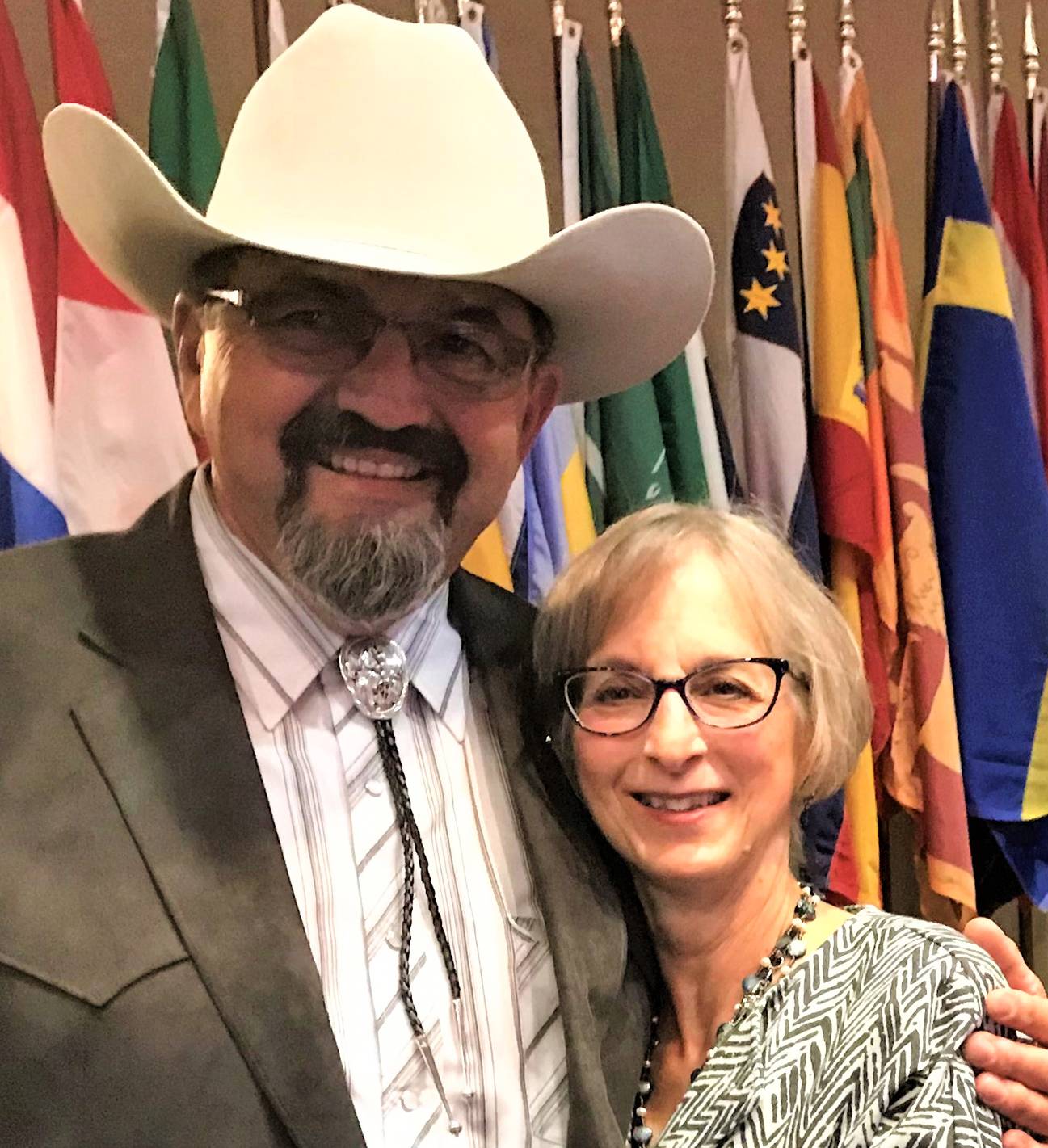
Months after graduation, Garcia joined the Dallas Police Department, quickly finding his way into tactical operations before becoming a hostage negotiator.
In 1980, Garcia moved to the FBI. Over a 25-year career in eight different field offices, including supervisory roles in Houston, Los Angeles, and Washington, D.C., Garcia cultivated a reputation for unusual and imaginative undercover cases. Colleagues called him “Inspector Gadget” for his creative use of novel technology to penetrate criminal enterprises.
“The adrenaline is what drove me,” Garcia says, “and I loved thinking creatively to capture individuals doing harm in the world.”
After retiring from the FBI in 2005, Garcia shifted into the private sector. He served as the global security manager for Shell Oil in Houston and as senior vice president for Vanguard Defense Industries before launching the 3RB Consulting Group in 2014. The firm provides investigative analyses of data as well as cybersecurity support for corporations and government agencies.
The Garcias continue to feed the endowment, while Rich Garcia, a trustee on Texas State’s Development Foundation Board, also visits Texas State criminal justice classes to discuss law enforcement careers.
“Since I’m retired these days and there’s still a lot going on in the world, someone else has to keep up with it,” he says. ✪
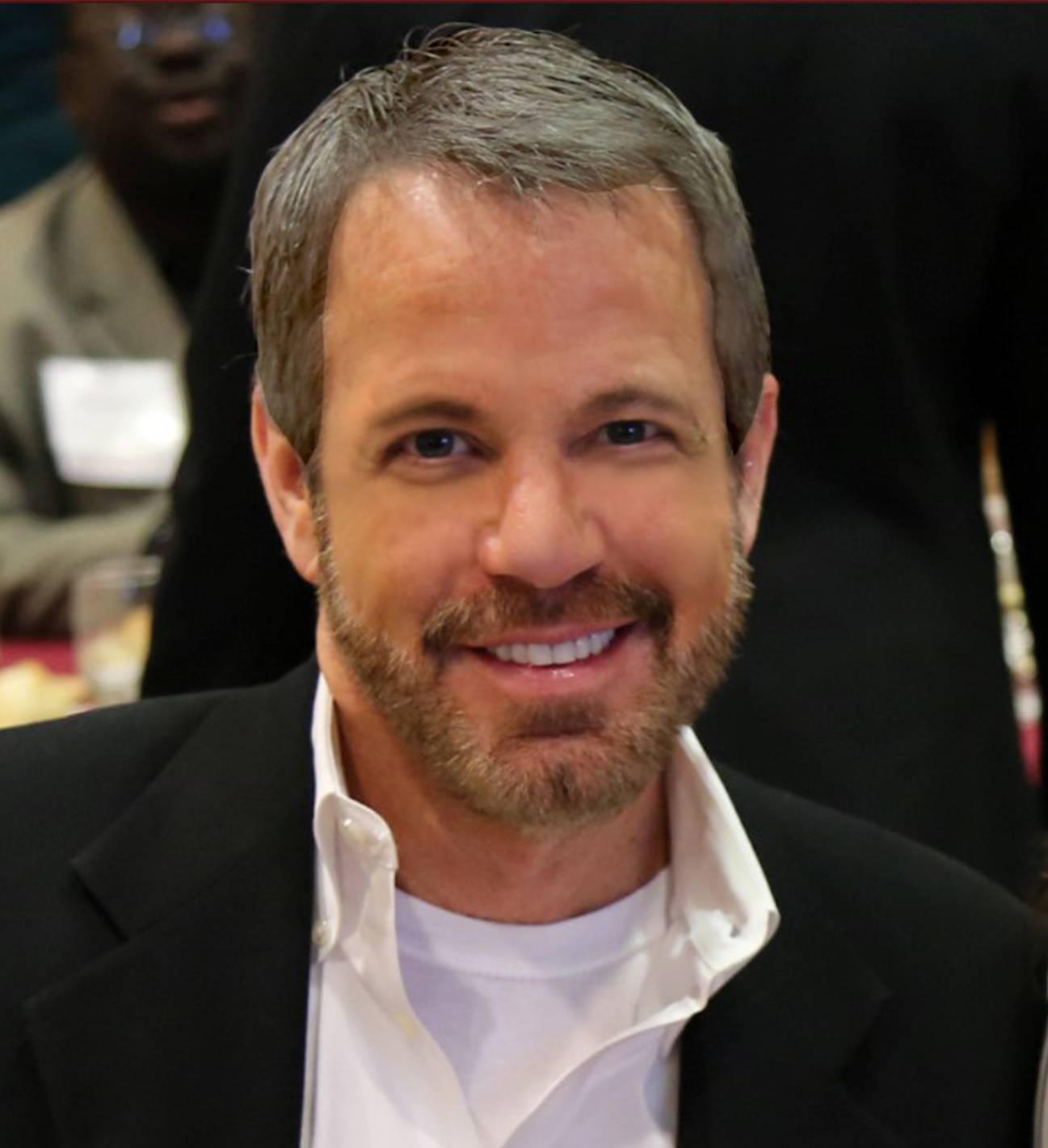
For as long as he can remember, Patrick Stolle (B.B.A. ’85) knew he wanted to be an entrepreneur.
In elementary school, Stolle purchased candy in bulk before selling individual pieces to classmates on Monday morning bus rides, while he also delivered groceries to a neighbor’s home via bicycle, a manual precursor to 21st century digital-era solutions such as Instacart and Shipt.
“I got a 10- or 15-cent tip,” Stolle recalls of his delivery efforts. “It was just in me to run my own business. I knew one day I would.”
This same kind of passion in business has increasingly led Stolle into philanthropy. In 2018, Stolle and his wife, Frances, established two planned gifts with Texas State University. The Frances and Patrick Stolle Endowed Scholarship in Entrepreneurship with the McCoy College of Business Foundation benefits management majors with a concentration in entrepreneurship, while the Frances and Patrick Stolle Endowed Scholarship in Athletics supports student-athletes majoring in business.
“I love the idea of helping others who have that entrepreneurial fire burning,” says Stolle, a member of the McCoy College Advisory Board who has also visited McCoy Entrepreneurial Studies classes as a guest speaker. “Texas State has given me a lot and I feel I owe something in return to the University, so that’s what I try and do.”
As a management major at Texas State, Stolle reveled in business classes that gave direction to his entrepreneurial energy and basked in a university climate that recognized hard work and drive.
He served in student government, was active in the Alpha Kappa Psi business fraternity, and helped bring Sigma Chi, one of the nation’s oldest social fraternities, to campus.
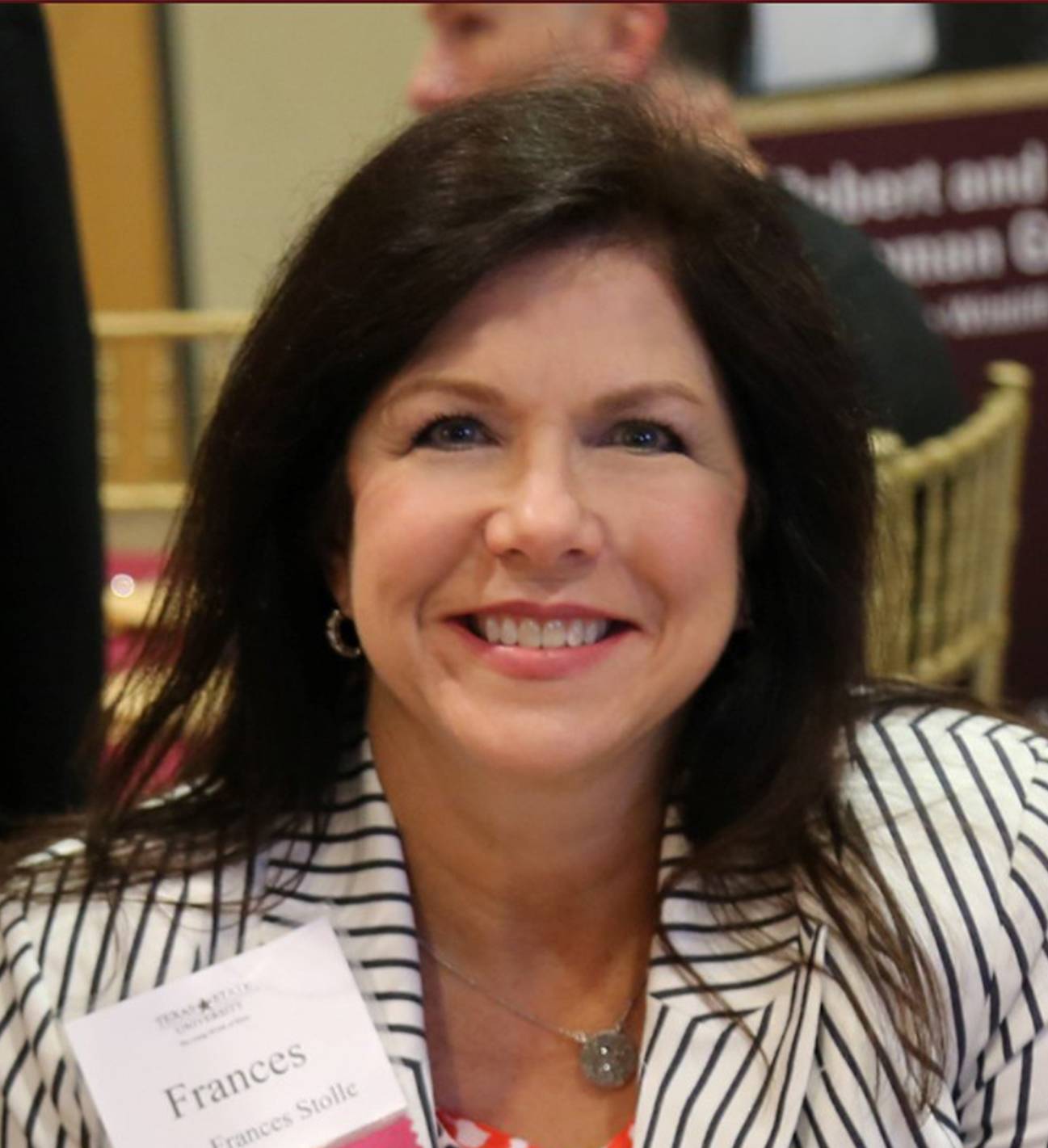
“My daily schedule was packed, but that’s what I wanted and why I thrived at Texas State,” says Stolle, a Houston area native who bucked the Longhorn family tradition established by four older siblings – a move his younger brother, Manolo (B.B.A. ’90), would also replicate.
When Stolle graduated, he landed a job at Xerox, beating out some 500 candidates for one of the enterprise’s few new-hire slots. “Xerox and IBM were the two behemoths everyone wanted to work for,” Stolle says.
After three years at Xerox followed by two more as a gas trader at Ferrell Petroleum, Stolle decided to fully activate the entrepreneurial energy stirring inside him. He left his corporate job, returned to his parents’ home, and launched Exsyst Inc., a petrochemical product exporter. “It was frightening,” he says of the entrepreneurial leap, “but it’s what I knew I always wanted to do.”
Exsyst’s success empowered Stolle to pursue other business opportunities. He flipped houses, invested in restaurants and electric vehicles, and established Camcon LLC, a commercial real estate operation. Most recently, Stolle has been devoting much of his time to Simpello, a patented, proximity-based technology that facilitates secure interactions between a customer and a service provider. Without individuals ever having to remove a smartphone from their pocket to access an app or QR code, Simpello’s technology enables a consumer to seamlessly board a flight, enter a members-only fitness studio, or pass through stadium turnstiles.
Though Stolle says his days as a serial entrepreneur can be long and stressful, overstuffed with meetings and phone calls and requiring him to switch industries on a moment’s notice, it is nevertheless an energizing existence.
“It’s a weird dynamic sometimes, but when all’s said and done, I wouldn’t want it any other way,” he says. “I feel it’s so important to find a passion in life and get after it.” ✪